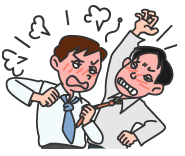 |
| Cases not covered by health insurance |
 |
 |
 |
| |
 |
|
 Cases where health
insurance does not apply Cases where health
insurance does not apply
|
 |
|
Freckles, birthmarks, pimples, moles,
body odor, and the like that do not obstruct job execution
or interfere with everyday life
|
|
Cases where health
insurance may apply in
exceptional circumstances¨
|
Cases where a condition exists that requires medical treatment
|
|
|
Nearsightedness, farsightedness, astigmatism, and
strabismus, with no chance of recovery
|
|
Cases where health
insurance may apply in
exceptional circumstances¨
|
Examinations, tests, and prescriptions for glasses in
cases where you notice a deterioration in your eyesight
and are seen by an insurance doctor
|
|
|
Cosmetic surgery
|
|
Cases where health
insurance may apply in
exceptional circumstances¨
|
Orthopedic surgery to deal with an injury
|
|
|
Health examinations, screening for
lifestyle related diseases, and complete medical checkups
|
|
Cases where health
insurance may apply in
exceptional circumstances¨
|
Treatment regarded as necessary as the result of an examination
|
|
|
Immunizations and preventive internal
medicines
|
|
Cases where health
insurance may apply in
exceptional circumstances¨
|
Inoculations against tetanus in cases where there is a
possibility of infection
|
|
|
Congenital disorders that do not obstruct
bodily functions
|
|
Cases where health
insurance may apply in
exceptional circumstances¨
|
Cases where treatment is not for cosmetic reasons, and
is commonly accepted as necessary
|
|
|
Normal pregnancy and delivery
|
|
Cases where health
insurance may apply in
exceptional circumstances¨
|
Cases such as Pregnancy Induced Hypertension, abnormal birth, etc. that require treatment
|
|
|
Voluntary abortions for economic reasons
|
|
Cases where health
insurance may apply in
exceptional circumstances¨
|
Abortions in accordance with the Mother's Body Protection Law other than for economic reasons
|
|
|
 Cases in which health
insurance benefits are limited Cases in which health
insurance benefits are limited
|
 |
|  The
conditions stated below represent obstructions to the administration
of the health insurance system. Benefits may be unavailable or
limited in the event one of the following descriptions applies. The
conditions stated below represent obstructions to the administration
of the health insurance system. Benefits may be unavailable or
limited in the event one of the following descriptions applies.
|
|
Incident caused intentionally
|
|
Accident resulting from a quarrel
or drunkenness
|
|
Failure to follow doctors' instructions
with no justifiable reason
|
|
Fraudulent or dishonest acquisition
(or attempted acquisition) of benefits
|
|
Refusal to answer questions or
acknowledge diagnoses according to Health Insurance
Societies' instructions
|
|
|
Health Insurance Societies will suspend or terminate benefits
as penalties for the above. They may also limit benefits when
the provision thereof is practically impossible or when superseding
laws so require; applicable cases of such limitation include
the following.
|
|
Internment in a reformatory or
imprisonment in a penal facility
|
|
Medical treatment at the expense
of the state or local governments, in accordance with "laws
related to the prevention and treatment of infectious
diseases"
|
|
|
 Injuries
sustained during work and while commuting to work will be
handled by Worker's Accident Compensation Insurance Injuries
sustained during work and while commuting to work will be
handled by Worker's Accident Compensation Insurance
|
 |
|
Health insurance provides benefits for non-work-related illnesses
and injuries. Injuries sustained during work and while commuting
to work will be handled by Worker's Accident Compensation Insurance.
Note that benefits may not be received from both health insurance
and Workersf Compensation Insurance for a single illness or injury.
*When even illnesses and injuries on-the-job are not targeted for benefits
of the Worker's Accident Compensation Insurance, benefits of the health insurance are
provided except the duties as the officer of the corporation (except for a corporation less than
five employees).
|
|
 |
|
 |
